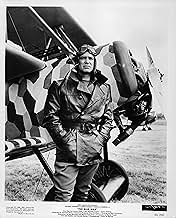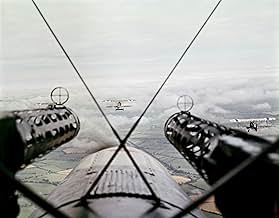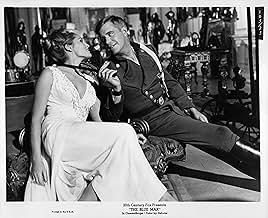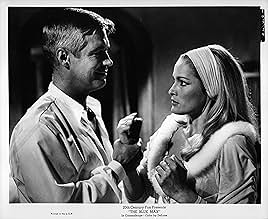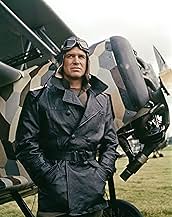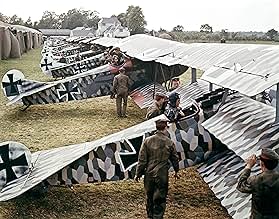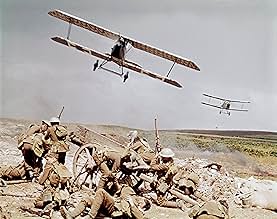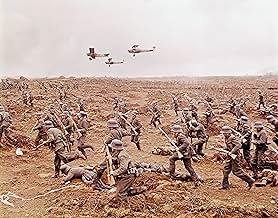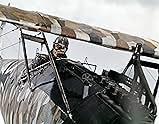Ajouter une intrigue dans votre langueA young pilot in the German air force of 1918, disliked as lower-class and unchivalrous, tries ambitiously to earn the medal offered for 20 kills.A young pilot in the German air force of 1918, disliked as lower-class and unchivalrous, tries ambitiously to earn the medal offered for 20 kills.A young pilot in the German air force of 1918, disliked as lower-class and unchivalrous, tries ambitiously to earn the medal offered for 20 kills.
- Réalisation
- Scénario
- Casting principal
- Victoire aux 1 BAFTA Award
- 1 victoire et 5 nominations au total
- Elfi Heidemann
- (as Loni Von Friedl)
- Feldmarschall von Lenndorf
- (as Friedrich Ledebur)
Avis à la une
The image is sharp and the colors are vivid. The sound is a bit conventional, but since the story is all-encompassing and well developed you will probably forget all technicalities and just sit through an excellent movie as I did.
The story deals with a simple German infantry soldier, stuck in the horror of the trench warfare, who dreams to fly and become an ace.
Well, he doesn't have to wait long and soon he's a flyer. he also becomes an ace.
Unfortunately, his modest social origins, keep him from the Sun, the Blue Max in fact. The Blue Max is the highest ranking medal given to pilots in WWI.
Knowing that, Stachel (Peppard) decides to fight all the odds and becomes totally ruthless and opportunistic.
Unluckily for him, two can play at the same game. The German Reich needs a hero, an example to play its cards right, in order to have more draftees to send to the front.
Stachel becomes such a hero, but to a price...
It is a crude and cruel depiction of the rise and fall of someone who came from nothing and through war, thought he could make it in society, only to find out that certain games are better left alone.
A very good morals and ethics lesson, from which many people could still learn something.
I can only suggest it. The rest is up to you.
Since the release of "Flyboys" it seems amazing that a movie made forty years ago has a more polished, advanced, and contemporary look than one made today. This will amaze people who compare films of the twentieth century one hundred years from now."The Blue Max" has better cinematography, special effects, acting, storyline, etc. In the end its a disappointing fact that today's films have taken giant steps backwards compared to those of the '60s.
The flying sequences and scenes of aerial combat in "The Blue Max" have never been surpassed or equaled. Even in "Flyboys" with millions of dollars of CGI effects no movie has ever captured the feel of flying and aerial fighting like this one. The planes all look authentic, too.
The big scope of World War One does not swallow up the intense personal stories here either. This is one of the only films that explores the psyche of successful fighting men. The arrogance they need to maintain their bravery and aggression can also be their downfall. Here we also can see the politics behind the combat, both on a personal and national level. This is a very thrilling history lesson.
The actors are so good, and the characters so complex I forgot they were supposed to be my (supposed) enemy. Peppard does a good job of acting, playing a guy who is meant to be both likable, admirable, irritating and repulsive at the same time. The only problem is he looks too American for the role. Imagine if Brando had done it, but he had a hard time choosing really good parts. My favorite is James Mason, who played German generals better than they could play themselves off-screen. If you like flying, history, or personal drama you can't miss this one.
Big-budget extended adventures produced by Elmo Williams about a maverick pilot and his partners undergoing risked feats on air and bombing on earth . Based on a novel by Jack Hunter and being well adapted by Franchina and Ben Barzman . Very good aerial actioner plenty action , steamy romance , drama , fantastic cloudy scenes and spectacular dogfighting . George Peppard shows professionalism as crack fighter pilot named Stachel , an ambitious youth assigned to dangerous missions . Top-notch support cast gives excellent performance as Jeremy Kemp as astute contender , Anton Diffring , Derren Nesbitt , Peter Woodthorpe , Loni Von Friedl and Carl Schell as Von Richthofen , the famous Red Baron . Rousing aerial scenes staged by Squire , being wonderfully photographed by Douglas Slocombe and marvelous musical score by the great Jerry Goldsmith are the chief assets of this spectacular film . This lavish airplane movie is professionally directed by John Guillermin , habitual of disaster films ( Skyjacked , King Kong , Kong lives ) , adventures ( Tarzan in India , Tarzan's greatest adventure , Sheena ) , Wartime ( Bridge of Remangen , Guns at Batasi , I was Monty's double ) and intrigue ( Death on the Nile , Shaft in Africa , The whole truth ) . John Guillermin usually worked with George Peppard in various films ( such as P.J , House of cards and Blue Max) and Peter Sellers (Never let go , Walz of the Toreadors) . 'Blue Max' is a rehash of the former airplane movie clichés in which the splendid casting stands out . Rating : Good and entertaining , it's a fairly watchable and breathtaking film and results to be a good treatment of WWI flying aces .
Unmistakably one of the most entertaining war films to come out of the 1960s, "The Blue Max" is the kind of film that could only have been made in Hollywood. Featuring some of the best aerial combat scenes ever shot and a great ensemble cast, it's enjoyable pulp fantasy for any war film fan.
The film opens with a brilliant, intense action sequence: Bruno Stachel (George Peppard, "Tobruk") dives into a mud-filled crater on the Western Front. He's visibly exhausted; his heavy breathing and unshaven face reveal how horrible front line conditions are. From above comes the sound of a dogfight Peppard's bright blue eyes blare from a mud-covered face as he stares in awe at the action in the skies above him, the mood fully established with Jerry Goldsmith's evocative score. Flash forward two years: Stachel has transferred to the Luftwaffe and is a green, inexperienced pilot. A peasant, Stachel has little in common with his high-class comrades, members of the elite Officer Corps. He's ruthless and ambitious, and sets his sight on winning a Blue Max the medal awarded to a pilot with 20 kills to his credit. With this award, Bruno will have won the respect of his comrades. Squadron commander Heidemann (Karl Michael Vogler, "Patton") has one, and hotshot Willi von Klugermann (Jeremy Kemp, "Operation Crossbow") is awarded one early in the film. Stachel vigorously has to catch up to their status, and Willi takes a liking to him, helping him try to fit in.
As Germany is losing the war, Willi's uncle, General von Klugermann (James Mason, "Cross of Iron") enters the stage: he sees potential in Stachel for more than just flying prowess. This is a time when the common people of Germany need a hero. Stachel is a poor farm boy, someone they can all relate to. Von Klugermann sets out to make Stachel a national icon; when he received a minor wound, he's escorted to a cushy Berlin hotel and the press takes pictures of a nurse tending to his wound, plastering pictures all over the national newspapers. Countess Kaeti von Klugermann (the beautiful Ursula Andress) sets her sights on Stachel, and soon a steamy affair has begun, right under the nose of the General. As Stachel's selfish ambitions become more apparent and blatant, Willi's friendly competitiveness fades and their adversity becomes an all-out battle. All of this builds to an unavoidable, somewhat depressing ending.
This is a character-driven drama firstly, and the action is simply a supplement to the story of the characters. Unfortunately, Peppard is a wooden lead. He speaks in unaccented English and never seems to be thoroughly involved in his part; it's as though he's sleepwalking through almost every scene. The rest of the cast deserves more credit. Co-star Jeremy Kemp is much more believable. He's sly, cynical and delivers fantastic deadpan humor. James Mason is brilliant as usual as General von Klugermann, a career German officer whose chief concern is for the German people and his nation's prestige. I have never seen Mason deliver a bad performance, and here he is simply fantastic. He's often cool and restrained, but lets anger and rage come out full-force at key moments. As his unfaithful wife, Ursula Andress is her typical self; beautiful and often barely concealed. A standout is Karl Michael Vogler as Heidemann. A veteran flyer devoted to his duty, Heidemann is a career soldier. He's been fighting since the beginning of the war, and although weary and tired, keeps doing his job. His chief goals are keeping as many planes flying as possible, despite Allied air attacks and supply shortages. He demands that Stachel's ambitions take second fiddle to strategic operations; when he disobeys orders, Heidemann threatens to have him court-martialed. Vogler's performance is excellent, and he walks away with each of his scenes.
Director John Guillermin and Director-of-Photography Douglas Slocombe weave some excellent flying sequences into the film's story. These action scenes are not independent conflicts between German and English fighters conflicts between characters are developed on the ground and either expanded or settled in the air. The skies have never been bluer, and the vintage aircraft look fantastic as they dive, swoop and strafe enemy columns. The stunt work and special effects are genuine, even some brilliantly-staged crash sequences. Even the work of Guy Hamilton and crew in 1969's "Battle of Britain" pales in comparison to this. The scenes of trench warfare and bombing runs are massive and spectacular. The mud-splattered soldiers, vast fields dotted with rotting corpses and bomb craters, and some hand-to-hand combat has never looked more authentic. Every cent invested in the film was put to good use. Scenes in Berlin particularly that in the hospital and food riots shot through a moving car window are historically accurate.
Guillermin isn't afraid to experiment with the camera during the discussion scenes. Note how he often places two actors in one room on opposite ends of the frame, simply to capture the scope of the interiors. Marvelous pans show off huge numbers of extras and planes taking off and landing. There's also a long crane shot showing a huge, lavish dining hall at the Von Klugermann's mansion which captures the essence of nobility and aristocracy in one shot.
"The Blue Max" is a brilliantly shot, engaging and wildly entertaining World War I epic which should satisfy any fan of aircraft and war films. This is a must-see DVD, which preserves the CinemaScope ratio (a necessary asset, as pan-and-scan versions detract from the epic look of the picture) and also features a great restored surround-sound track and stunning digital image quality. It's the only acceptable way to see this film in the modern world.
George Peppard plays a more ruthless version of the Brando character in the previous generation in The Blue Max. He's a survivor of the trenches who gets an opportunity to learn to fly and transfer in the Air Corps. What comes with it is a commission and while Peppard is now an officer he's no gentleman.
There's a whole different ethic operating in the Air Corps. The pilots see themselves as an updated version of the Teutonic Knights of old. A view by the way shared by both sides. The fliers on both sides see themselves as old fashioned chivalrous sorts who glory in single combat. They are also upper middle class and aristocratic types and Peppard doesn't quite fit in.
You can put him in a biplane and give him rank, but his outlook doesn't change. What Peppard does see is that if he makes 20 confirmed kills he gets awarded the Blue Max decoration and his future and respectability is secure.
James Mason who commands the Flying Corps takes an interest in Peppard's rise. His political instinct tells him revolution is in the body politic. Make heroes out of someone like Peppard who would be part of the proletarian masses will help give those masses a vested interest in the Wilhelmine regime and would forestall revolution. Of course wife Ursula Andress has some different ideas about Peppard.
I like The Blue Max because it is a film about more than aviation. It is about what was happening in Germany during those last days of World War I when Germany was desperately trying to break the stalemate on the western front and pull out a victory before American troops were in sufficient numbers. They almost pulled it out in fact. It's about attitudes, old, new and changing. All three of the leads suit their roles perfectly.
As a veteran of World War I if he didn't gain the respectability out of the war he craved, Peppard would have been ripe for the Nazi propaganda that filled Germany and was finally heeded during the Depression. The Nazis filled their ranks with Peppards up and down Germany.
Which is why The Blue Max should be seen and learned from because it is not just about World War I aviators as good as the aerial footage is here.
Le saviez-vous
- AnecdotesFox wasn't able to rent any of he surviving WWI planes still extant, so they built their own. The aircraft were later used in "Darling Lily" and "You Can't Win Them All."
- GaffesThe German award called the "Pour le Mérite" (a.k.a. the Blue Max) was awarded at the beginning of the war to pilots who shot down 8 enemy aircraft; that was later raised to 16. The requirement was never 20 as depicted here.
- Citations
Willi von Klugermann: By the way, Stachel... there's an impression around that... you care more about your unconfirmed kill than you do about Fabian's death.
[long pause]
Bruno Stachel: Perhaps it's force of habit. In the trenches, we couldn't even bury the dead; there were too many of them. I've never had the time... to discuss them over a glass of champagne.
- Versions alternativesIt is believed that this film was at one time released in a 70 mm version (because of its six channel soundtrack), but this has never been confirmed.
- ConnexionsFeatured in The Amazing Howard Hughes (1977)
- Bandes originalesDeutschlandlied
(uncredited)
Music by Joseph Haydn
Lyrics by August Heinrich Hoffman von Fallersleben
Played at Stachel's medal presentation
Meilleurs choix
- How long is The Blue Max?Alimenté par Alexa
Détails
Box-office
- Budget
- 5 000 000 $US (estimé)
- Durée2 heures 36 minutes
- Couleur
- Mixage
- Rapport de forme
- 2.35 : 1
Contribuer à cette page



